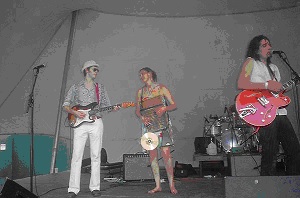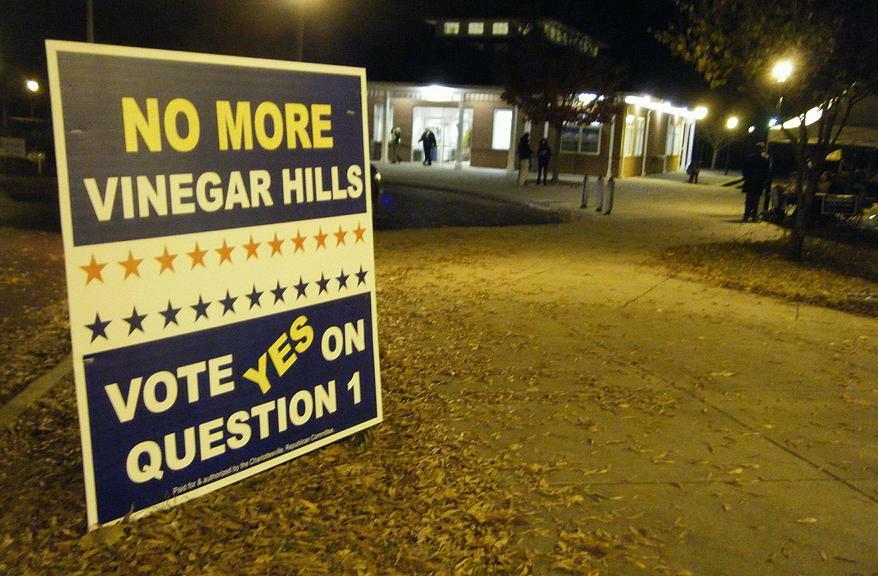

|
The 2005 Kelo decision resonated across America because Eminent Domain for Economic Development was already commonplace and familiar. The Blue Ridge Buck Saver was ready with full-page editorials. Michigan Supreme Court had already reversed its 1981 Poletown decision to allow removal of 5,000 residents and schools, churches, businesses, etc. for a luxury automobile factory in Detroit, which flopped. Multiply by 100s and you have the vast ghetto which is modern Detroit. Yet politicians see no connection between the two, or why the same best practice would cause the same disaster elsewhere. Today you must call it Economic Vitality or Economic Growth to reassure the public that your project is legal, not calling for eminent domain abuse. Albemarle Supervisor Ken Boyd learned that the hard way. Yet City politicians routinely call for eminent domain abuse using the name economic development. The local examples are invisible only to the local politicians and the media. Friday was the 12th anniversary of the 5–4 landmark decision by the Supreme Court that reaffirmed the status quo. Neither due process nor public use is required to seize property. Urban renewal is the violation of the 5th Amendment. So is asset forfeiture, in addition to 4th Amendment violation. In both cases due process requires you be found guilty of something for a right to be ignored. Eminent domain was supposed to be the only exception.
 Charlottesville parties in seized neighborhood the day after Eminent Domain ruling. Jun. 24, 2005.
Charlottesville parties in seized neighborhood the day after Eminent Domain ruling. Jun. 24, 2005.
I canít imagine us justifying taking away someoneís property to sell another property. – Charlottesville Mayor David Brown. UVa alumnus talks about eminent domain. Feb. 16, 2005. Charlottesville Independent Media. Government should get out of the land business. – Steven Anderson, attorney.
He said eminent domain is a "sovereign power" that predates the Constitution. The king could take land for any or no reason. The Constitution limits this "despotic power," as the Supreme Court described it two hundred years ago. He said there were 3 main exceptions to the public use restriction against private transfer of property:
 This third group of exceptions include urban renewal, which the Supreme Court ruled Constitutional in the 1954 Berman v. Parker case in southwest Washington, D.C. At the time, cities were thought of as organisms with diseased or blighted parts. Justifications for blight removal were health, safety, and morals. In southwest D.C. there was an outbreak of a sexually transmitted disease. The approach to blight was not piecemeal. You could tear down a nice house next to a blighted house. But southwest D.C. is no better today than it was 50 years ago.
This third group of exceptions include urban renewal, which the Supreme Court ruled Constitutional in the 1954 Berman v. Parker case in southwest Washington, D.C. At the time, cities were thought of as organisms with diseased or blighted parts. Justifications for blight removal were health, safety, and morals. In southwest D.C. there was an outbreak of a sexually transmitted disease. The approach to blight was not piecemeal. You could tear down a nice house next to a blighted house. But southwest D.C. is no better today than it was 50 years ago.
Anderson went on to say that the tide of eminent domain for private purposes may be turning. Last summer, the Michigan Supreme Court overturned its own 1981 decision to allow a neighborhood be cleared for a General Motors auto plant. This was the first case where economic development and increased tax revenue justified eminent domain for purely private use. This project also fell short of its promises. The Michigan court reversed itself in an 8-0 ruling. (Michigan Supreme Court rules: Economic development is not eminent domain. Aug. 2, 2004. Site defunct.)
Anderson further said that, if the high court rules in favor of the city of New London, every property in the country is at risk. The people most at risk are "overwhelmingly minority and elderly." Friend of the court briefs have been filed by the NAACP, the Southern Christian Leadership founded by Martin Luther King Jr., the AARP, Rutherford Institute, farm bureaus, and others.
The true anger is at the worse financial situation they now find themselves in, having to take out second mortgages to sustain a lower standard of living. He reported that "clear cutting" is widespread in Philadelphia and Camden just across the river. In Riviera Beach, Florida, the city wants to transfer 1,700 acres where 5,100 people live. The Southwest Illinois Development Authority rented out its eminent domain power. You could pay them to take someone's land for you and the agency even used the words "private use." In his final remarks before the question period, Anderson said "government should get out of the land business." [Hawkins] asked, if the court rules in favor of property rights, what happens to land seized 30 or 40 years ago, that remains open space. Still nobody wants to buy the property because of the intense controversy. Anderson said it's too late. The court's decision will not undo what's already happened. There would have to be legislation to have the land returned to its rightful owners.
 The 2012 Amendment passed with 75% statewide. The weakest support at 60% were urban liberal areas with a history of eminent domain abuse and associated problems. Just compensation is strengthened. Blight is broadened to public nuisance.
The 2012 Amendment passed with 75% statewide. The weakest support at 60% were urban liberal areas with a history of eminent domain abuse and associated problems. Just compensation is strengthened. Blight is broadened to public nuisance.
Seized property sits vacant nine years after landmark Kelo eminent domain case. Published March 20, 2014. Fox News.
"Seized property sits vacant nine years after landmark Kelo eminent domain case. The 90-acre [neighborhood in New London, Connecticut] once earmarked for office buildings, luxury apartments and a new marina, remains vacant. Seven residents who fought all the way to the Supreme Court to keep their working-class homes in the city's Fort Trumbull section have only their memories and whatever remains of the money they were forced to accept. In the landmark 5-4 ruling [...] Previously, eminent domain had been seen as limited to cases involving projects deemed as benefiting the public, but not a private economic interest."
Home | Charlottesville, Virginia | blair@blairhawkins.net | Résumé | Top |
